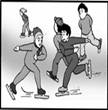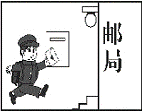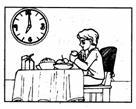网址:http://m.1010jiajiao.com/timu_id_821526[举报]
(一)交际应答。录音中有五个句子,每个句子听一遍,然后从每小题A、B、C中选出能对每个句子做出适当反应的答语。
1.A.Yes, please. B.Good idea. C.Of course, it is.
2.A.Certainly you are. B.Sure. Hold on, please. C.I’ll do that.
3.A.Oh, they are over there. B.I’m glad you’ve found it. C.Go straight and turn left.
4. A.OK, I wil. B.Yes, I think so. C.Good for you.
5.A.Never mind. B.You are welcome. C.I’m sorry.
(二)情景反应。录音中有五组对话,听对话两遍后,从每小题A、B、C中选出能回答所给问题的正确答案。
6.When will Mrs White come back?
A.Right now. B.Quite soon. C.At four.
7.What sport does the woman like?

8.What does the woman prefer to do?
A.To see the new play. B.To do some shopping. C.To visit the museum.
9.What are the man and woman doing?
A.They are looking for a CD player in a shop.
B.They are learning how to press the button.
C.The man is teaching the woman how to use the CD player.
10.Why was Frank on the news last night?
A.He walked along the beach at night.
B.He swam alone in the cold water.
C.He got the boy out of water and saved him.
(三)对话理解。录音中有一段对话,听对话两遍后,从每小题A、B、C中选出能回答所给问题的正确答案。
11.Where could the dialogue happen?
A.In a shop. B.In a library. C.In a hospital.
12.Why did the young man go to see the doctor?
A.He didn’t know where to begin his talk.
B.He felt difficult to fall asleep.
C.He felt unhappy most of the day.
13.How long has the young man been ill?
A.For about two years. B.For about three weeks. C.For about six months.
14.In what season did the young man feel worse?
A.In Spring. B.In Autumn. C.In winter.
15.What did the doctor ask the young man to do?
A.To take some medicine. B.To burn away his worries. C.To take more exercises.
(四)短文理解。录音中有一篇短文,听短文两篇后,从每小题A、B、C中选出能回答所给问题的正确答案。
16.What happened to the three boys in a cold day?
A.They lost their way.
B.They couldn’t find the big house.
C.They had to spend the night in the open air.
17.What did the three boys ask the farmer to do?
A.To give them some water and food.
B.To let them stay in his house for a night.
C.To tell them the way to walk out of the forest.
18.Why did one of the boys have to sleep in the big house?
A.The farmer didn’t like the third boy.
B.One of the boys made a loud noise when he slept.
C.There wasn’t enough room in the farmer’s house.
19.Who was the first to sleep with the horses?
A.Mike B.Jack C.Tom
20.Why were all the horses outside at the house door?
A.Because someone drove them out of the house.
B.Because the smell in the big house was really terrible.
C.Because the horses didn’t like to stay with people at night.
查看习题详情和答案>>听力测试
(一)听句子,选择与画面一致的选项。每个句子听一遍:




1. ( A B C ) 2. ( A B C ) 3. ( A B C ) 4. ( A B C )
(二)、请听句子,选出恰当的答语。每个句子听一遍:
( )5. A. It’s Sunday. B. It’ April 21. C. It’s half past eleven.
( )6. A. It’s very hot. B. It’s very heavy. C. It’s very large.
( )7. A. Yes, please. B. You are welcome. C. Sorry, I can’t.
( )8. A. No, it isn’t. B. Yes, it is. C. Thank you.
( )9. A. About 40 minutes.
B. About half an hour’s walk.
C. About 5 meters long.
( )10. A. I think it is interesting.
B. I like a story.
C. I’m reading.
(三)听对话,宣战正确答案。每组对话听两遍。
( )11. When was Edison born?
A. In 1874. B. In 1931. C. In 1847.
( )12. Why wasn’t the boy at school yesterday?
A. He had to look after his mother.
B. He had to look after his father.
C. He was ill in bed.
( )13. What’s the woman’s telephone number?
A. 3897244. B. 3879224. C. 3789244.
( )14. Why was the girl late again for school?
A. She was ill. B. She got up late. C. She met a traffic accident.
( )15. When does the dialogue happen?
A. During class. B. After class. C. Before class.
( )16. What does the girl’s mother do?
A. A nurse. B. A doctor. C. A worker.
( )17. What size does the man wear?
A. The large size. B. The small size. C. The medium size.
(四)对话理解: 对话听两遍:
听第一段对话,回答第18-21小题。
( )18. What’s wrong with the boy?
A. He’s got a headache. B. He’s got a high temperature.
C. He’s got a cold.
( )19. How long has he been like this?
A. For one day. B. For two days. C. For three days.
( )20. Is he seriously ill?
A. Yes, he is. B. Yes. But he will be well soon. C. No, he isn’t.
( )21. How many times should he take the medicine a day?
A. One time. B. Two times. C. Three times.
听第二段对话,回答第22-25小题。对话听两遍:
( )22. Where does the man want to go?
A. London. B. Hong Kong. C. America.
( )23. When will he go there?
A. June 29th. B. June 30th. C. July 1st.
( )24. When will the earliest flight leave?
A. At 7:00 in the evening. B. At 8:00 in the morning.
C. At 7:00 in the morning.
( )25. Does it stop in Beijing?
A. Yes, it does. B. No, it doesn’t. C. We don’t know.
(五)听短文回答问题,短文听两遍。
( )26. Where did Mr. White work?
A. France. B. America. C. England.
( )27. Why was Mrs. White angry?
A. Her husband wouldn’t go to see their son.
B. Her husband was hit by a car.
C. Her husband didn’t love her.
( )28. How did Mr. and Mrs. White go to Paris?
A. By ship. B. By train. C. By plane.
( )29. Mr. White didn’t know how they had got to Paris because _____ on their way.
A. he was asleep
B. he was thinking about his work
C. he was worried about his son
( )30. From this passage we know_____.
A. Mr. White loved nobody except himself
B. Mr. White couldn’t get on well with anybody
C. Mr. White was always interested in his work
查看习题详情和答案>>is the biggest in the Games' history. Here let's know about some torchbearers.
◆ Luis Hone, 14, is from Colombia. He lives in Zhuhai, Guangdong Province. He moved to China with
his parents as a baby. "I can speak English, Chinese and Spanish. I love China, which has been my world
all my life," he said. "The torch relay is a good chance to improve the understanding between people of the
world."
◆ Sang Lan, 26, will complete the torch relay using her wheelchair. Sang's fingers are not agile (灵活的)
because of her injury (受伤). The IOC officials suggested adding framework (框架) to her wheelchair to
hold the torch. But she insists that she will hold the torch with her hands. "I believe if you put your heart
into something, you can solve any problem," she said.
◆ Liu Xuan, 17, is from Nanjing Foreign Language School. He is an energetic student. He enjoys various
sports including football, basketball, badminton and running. "It will be an honor to be a torchbearer," he said.
◆ Zhang Jie, 23, is a reporter with Guangzhou Daily. "Torch relay is a good way to let the world know
China better," Zhang said. "Tin very proud that I can be part of it."
(Teens Daily, Feb 21, 2008)
B. 10 years.
C. Less than 10 years.
D. More than 10 years.
B. Sang Lan.
C. Liu Xuan.
D. Zhang Jie.
B. Sang Lan will hold the torch with her hands.
C Luis is a student in a foreign language school.
D. Liu Xuan can speak several languages.
B. Because she is busy.
C. Because she isn't able to do it.
D. Because she can't find her pen.
B. He asked her to go climbing the hills.
C. He asked her to see the photos.
D. He asked her to go picking oranges.
B. In a hospital.
C. In his office.
D. Out of the town.
B. Yes, but only twice.
C. No, she hasn't.
D. Yes, many times.
B. 12 hours.
C. 4 hours.
D. 14 hours.
B. Yes, because she wants to help him.
C. No, because she has already spent most of the money.
D. No, because she has already lent it to one of her friends.
B. Art.
C. Science.
D. English.
B. Four.
C. Five
D. Six
Sitting on a chair all day in school can make anyone want to move around. So, more and more teachers are letting students have a ball. By sitting on exercise balls instead of chairs, teachers find students' posture (姿势) and attention improve.
Dottie Pownall, a fifth-grade teacher in West Virginia, USA, has been using balls as chairs since December 2008. "The students love them", she says. Pownall took a survey of her students. She found that 80% of the students thought sitting on the balls helped them pay more attention to what they were learning.
The teacher, Pisa Witt, felt so strongly about the use of balls as chairs, she started Witt Fitt. This company encourages the use of the balls. And the company educates not only teachers but also students on how to use them. "Our products are used in 24 states, three provinces in Canada, Puerto Rico ('波多黎各) and Japan," says Witt. "Research shows that sitting on the balls makes them sit up straighter. You can slouch (低头垂肩地坐) on a ball," says Witt, "but it feels awful." Because the students are moving, their blood (血液) increases. That carries more oxygen (氧气 to the brain (大脑), so the kids have more energy and can focus longer.
"Furthermore, they're fun." says Pownali.
1. What will happen if a student sits on a chair all day in school? The student will _________.
A. pay more attention to his lessons B. be fun
C. like to move around D. sit up straighter
2.How long has Dottie Pownall used the balls?
A. About three years. B. Only one year.
C. In 2008. D. Since he was a fifth-grade teacher.
3. In how many countries are the balls used as the students' chairs?
A. Four. B. Three. C. Two. D. One.
4. Teachers choose balls instead of chairs because sitting on balls helps the kids___________.
A. improve the students' posture and attention B. slouch on the chairs
C. have fun D. Both A and C are correct answers.
5. Which is better for kids to study in class, sitting on a chair or sitting on a ball?
A. Sitting on a chair. B. Sitting on a ball.
C. They are the same. D. We don't know.
查看习题详情和答案>>